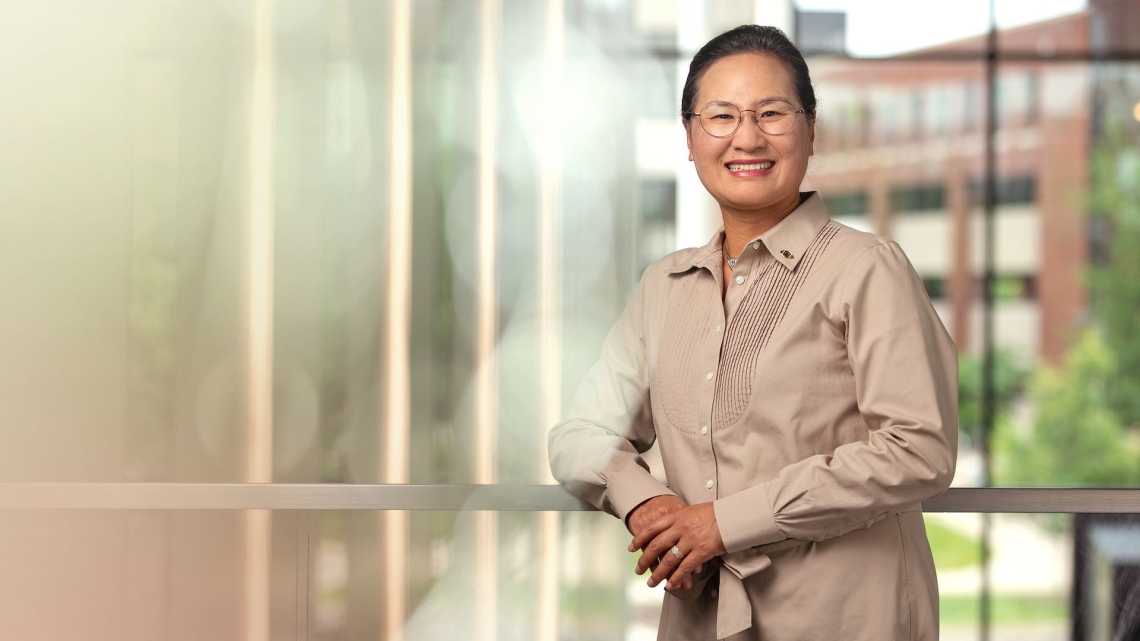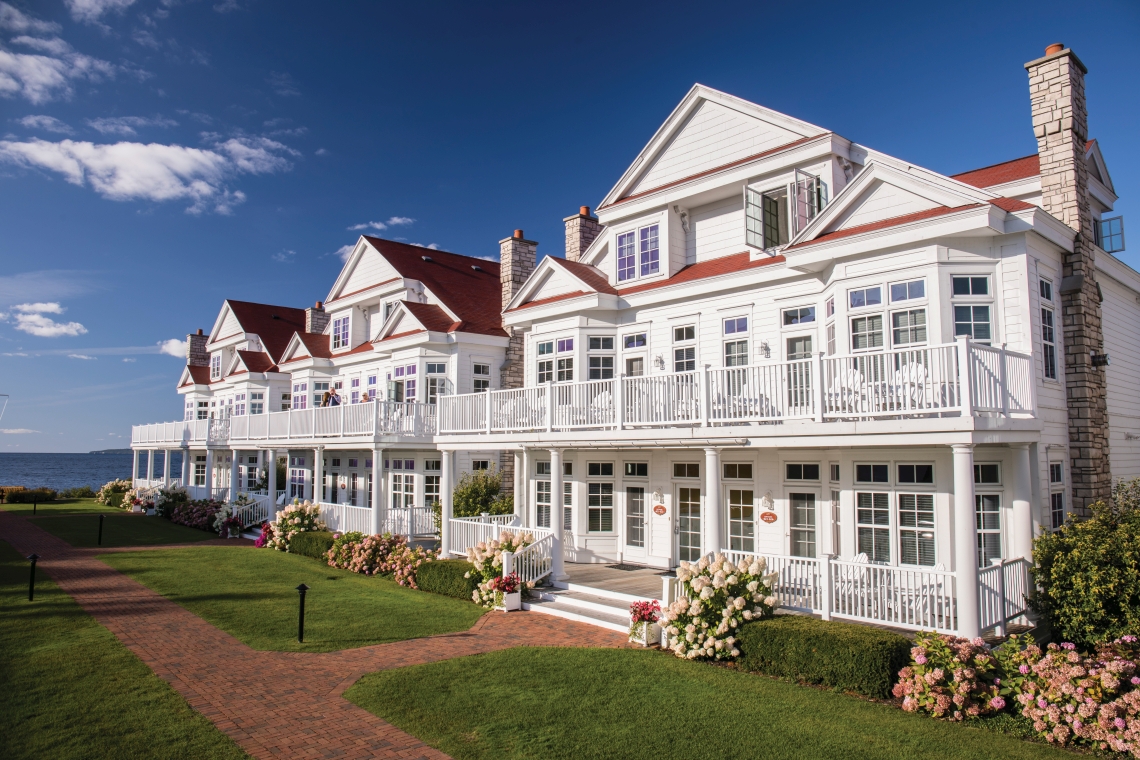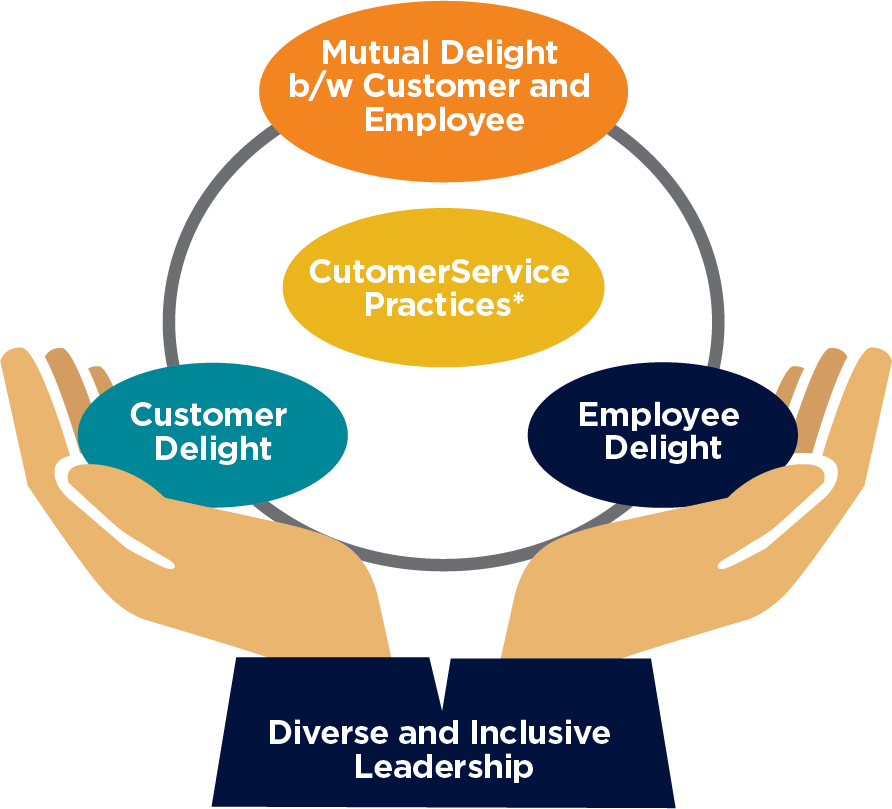Frightful to Delightful: "Customer Delight" as a Sustainable Business Model
- MiRan Kim, Ph.D.
- Associate Professor, The School of Hospitality Business
- Eli Broad College of Business

Dr. MiRan Kim, an "ambassador for customer delight" in the hospitality industry.
The year 2020 has been frightful for almost every sector, and few industries have been impacted by the COVID-19 pandemic as severely as the hospitality industry. According to the American Hotel and Lodging Association's State of the Hotel Industry Analysis as of August 31, 2020, more than $46 billion in room revenue and 70 percent (4.8 million) of hospitality and leisure jobs had been lost. Even before the coronavirus pandemic hit in early 2020, the hospitality business faced an increasingly challenging environment. Rising consumer sophistication and expectations, evolving social and generational norms, and fluctuating economic conditions challenged the industry to be continuously innovative.
"We know the business market is getting tougher, more competitive, and customers are becoming more sophisticated. They compare the experiences they receive with what they expected to receive from the service providers," said MiRan Kim, associate professor in The School of Hospitality Business. "In the hospitality business, service innovation is vital for survival; it is the engine of competitive advantage."
Beyond Satisfaction to Delight

The Inn at Bay Harbor, in Bay Harbor, Michigan, is an industry partner assisting with Kim's research.
Companies that succeed today are going beyond customer satisfaction to customer delight, providing guests with a pleasurable element of surprise that exceeds expectations. This concept comes from the Cajun word, lagniappe, which means a little bit extra. Having spent much of her life training in and researching the hospitality business, beginning in her home country of South Korea and then expanding internationally, Kim has become, in her words, an "ambassador of customer delight," passionately pursuing guest service innovation in her research and instilling these principles in her students.
Kim and co-researcher Bonnie Knutson, professor in The School of Hospitality Business, along with undergraduate students Christina Heydenburg and Vinh Le, have received funding from the Society for Hospitality and Foodservice Management to research customer delight and its impact on sustainability in the hospitality business.
"This study is designed to help hospitality practitioners clearly understand the difference between satisfying and delighting a customer," said Kim. Quoting Ken Blanchard, a well-known author on leadership development, she said, "'Just having satisfied customers is not good enough anymore. If you want a booming business, you have to create raving fans.' The findings will help demonstrate the importance of delight as a management tool to create advocates, thereby increasing customer lifetime worth and generating referrals."
Delight From the Inside Out

A newly remodeled suite at Inn at Harbor Bay.
Looking at sustainable business practices from the inside out, this research considers a company's employees as its "internal customers," the workers on the front line of providing delightful experiences to external customers, the consumers.
"Staff and customers are critical elements in developing innovative services and products," said Kim. "Thus, to build a sustainable business, this study's primary learning goal is to provide a comprehensive understanding of the concept of delight—employee delight, customer delight, and the relationship between employee delight and customer delight—as a core business practice."
Utilizing a quantitative online survey approach, the research is being conducted in two phases: the first phase is surveying the perspective of industry employees on the effects of diverse and inclusive leadership on employee delight, examining similarities and differences in relationships among inclusive leadership, team-member exchange, and employee delight across different generational groups. The second phase is surveying hotel and restaurant guests to identify how customer service factors (safety/health, innovativeness, uniqueness, fun/enjoyment, compliment/upgrade) impact customer delight, and to examine if factors of employee delight (such as diverse and inclusive business environments) consequently impact customer delight.
Sustainability in the Face of Unsustainable Losses
When the coronavirus pandemic hit in early 2020, "sustainable business practices" took on a new level of meaning. Even looking at just the foodservice industry, the statistics are dismal. According to Knutson, data are showing that approximately 60 percent of restaurants will never reopen. "And most of those are going to be mom-and-pops and independents," she said. "They are the neighborhood gathering places, the glue that hold the culture of a city or town together."
As thousands of businesses have had to scramble to accommodate the restrictions and impacts of the pandemic, Kim and her team have broadened the focus of their research to reflect the current situation. For example, recent surveys now include such questions as whether hand sanitizing stations are available or whether there are signs reminding guests to maintain social distancing. Customer delight must now, by necessity, include increased measures to ensure safety around COVID-19, creating new expectations for both employees and customers and a new normal for businesses moving forward.
"Currently, no one can accurately predict when this COVID-19 pandemic will be at a point where the U.S. hospitality engine can reopen in what will be a new normal," said Kim. "However, current projections do not envision that the U.S. will be back to any normal within the next several months. Therefore, the timing of our research and its publication is particularly relevant as it will provide data from both customers and "front line" employees for valuable input to guide tomorrow's sustainable hospitality business models."
According to Knutson, the surveys will also provide a point-in-time comparison with previous research. "A survey is a snapshot; it's a point in time," said Knutson. "MiRan and I have done other delight-type studies, so we have an idea of what it was like pre-COVID. Some of the questions we have integrated into this study are some of the same questions we used in previous studies. So, we'll be able to say, 'Is there a difference? And post-COVID, is there going to be another difference?'"
After the surveys are completed, they will be analyzed by expert sources and industry professionals for content validity and will be followed up with pilot studies involving both employees and guests. Ultimately, the goal is to inform the translation of results into effective business models.
"Research is only as good as it answers the question, 'So what?' I'm here to say, 'Here's how the industry can use this. Here's what this means. Here are some ideas for you to take this and operationalize it.' Because if we just do research to take and stick on a shelf, it's interesting research. But we are a land-grant university. We are charged with helping our state, our nation, and the world," said Knutson.
Emerging Into a New Normal with Delight-Focused Business Models

One goal of Kim's research is to demonstrate the connection between employee and customer delight.
Kristi Noyes, managing director of Systopia International, Inc. and foundation chair of the Society for Hospitality and Foodservice Management, explains how customer input will be vital for the industry as the economy begins to improve. "Obviously, the economy is key, as the hospitality industry relies in large part on discretionary spending by its customers," said Noyes. "Assuming a reasonable economic recovery, businesses that survived the pandemic will need to listen to their customers with a keen ear (what delights their customers in the new normal?), innovate to meet new challenges (regulatory, physical, social), and ensure that their employees are in-tune and onboard with new ways of conducting business."
"Dr. Kim's team's research is unique in that it explores several trending management initiatives (inclusion/diversity, employee retention, customer loyalty), explains their delicate inter-connections, and provides a roadmap for businesses to excel in all initiatives, separately, and therefore to succeed holistically," she said.
Kim is passionate about passing along these principles to her students, who have the potential, as emerging young hospitality professionals, to contribute to new growth in the industry. One of Kim's seniors, Christina Heydenburg, is enthusiastic about the experience she has received. "My involvement in this research will help me learn about the importance of looking at the big picture of hospitality and all the different factors that contribute to delighting guests," she said.
As hospitality businesses emerge from the losses and impacts of the pandemic, being sustainably focused will be more critical than ever.
"With an unknown future ahead, industry leaders are struggling to design sustainable hospitality business models at the very time that these models are becoming increasingly important," said Kim. "Customer delight, one of the inspirational and innovative service concepts, will be an imperative tool for sustainable business."
- Written by Amy Byle, University Outreach and Engagement
- Photographs courtesy of MiRan Kim, Inn at Bay Harbor, and Matt Mitchell Photography for the Broad College of Business